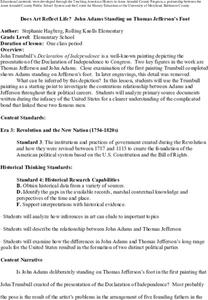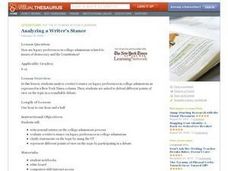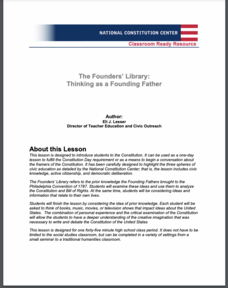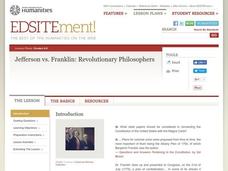Curated OER
The Federalist Debates: Balancing Power Between State and Federal Governments
Students examine the pros and cons of state sovereignty vs. federalism, as argued by the Founding Fathers. They identify the basic positions of each side, complete a worksheet, and write a persuasive essay arguing for Jefferson or Hamilton.
Curated OER
The Constitutional Convention: What the Founding Fathers Said
Students list some ideas proposed and debated during the Constitutional Convention, and discuss the important issues requiring compromise during the Constitutional Convention.
Mr. Nussbaum
THE Founding Father
Who is the founding father—George Washington, Thomas Jefferson, or Benjamin Franklin? Scholars decide which of three early Americans, should be crowned the founding father of America based on research. Then, they compose a persuasive...
Center for History Education
The Founding Fathers and the Constitutional Struggle Over Centralized Power
Believe it or not, the Constitution was America's second attempt at a democratic government. Academics travel back to the past to explore the shortcomings of the Articles of Confederation that would eventually lead to the Constitutional...
Center for History Education
Why is John Adams Standing on Thomas Jefferson's Foot?
Was it a bromance, or were they frenemies? Young historians use a controversial portrait and letters between Thomas Jefferson, John Adams, and others to evaluate the relationship between the two Founding Fathers. Examining the primary...
National Endowment for the Humanities
Lost Hero: Was John Hanson Actually the First President?
The first president of the United States was ... John Hanson? Scholars investigate the notion that the initial leader of the nation was not George Washington. Using research, articles, and open discussion, individuals create a quest for...
Ashbrook Center at Ashland University
Ratification of the Constitution
How difficult was it to get everyone to agree on the contents of the Constitution? Historians analyze the task of the Founding Fathers in creating the United States Constitution. They research a directory of video clips, primary sources,...
Curated OER
The Constitutional Convention: What the Founding Fathers Said
Middle schoolers critique the Creation of the U.S. Constitution. They list some ideas proposed and debated during the Constitutional Convention. Discussion of the important issues requiring compromise are examined.
Curated OER
The Origins of American Government
Learners create an advertising campaign to persuade the Founding Fathers to adopt a particular political philosophy. Working in groups, they conduct research about a certain political philosophy. Students create a pitch to be made to...
US National Archives
Benjamin Franklin: Politician and Diplomat
A scientist, inventor, entrepreneur, politician, and the founder of a nation—and that's just one person! Learners investigate the many lives of Benjamin Franklin. Using a hands-on interactive online resource, they analyze primary...
National Endowment for the Humanities
Lesson 4 James Madison: Internal Improvements Balancing Act—Federal/State and Executive/Legislative
Who has the power? The founding fathers asked the same question when the United States was formed. Learners explore issues that arose during Madison’s presidency that raised constitutional questions. Through discovery, discussion, and...
ProCon
Electoral College
The Electoral College's role in elections is sometimes confusing and controversial. Pupils use a debate topics website to research the pros and cons of the practice to debate whether the United States should still use the Electoral...
DocsTeach
Road to Revolution: Patriotism or Treason?
Patriot or traitor? Scholars debate the line between patriotism and treason in a short activity. Academics analyze a political cartoon and discuss varying viewpoints between different groups living in the American colonies. The activity...
Curated OER
Analyzing a Writer's Stance
Should college admissions decisions be based on whether whose family members attended? Secondary students read and respond to a New York Times article on the issue of 'legacy preferences' in college admissions. Following class...
Curated OER
The Federalist Debates: Balancing Power Between State and Federal Governments
Students explain the basic positions of the Federalists and the Anti-Federalists. They chart the differences and similarities between state and federal governments. They write a persuasive essay in response to an open-ended question.
Curated OER
The Founders’ Library: Thinking as a Founding Father
Students analyze the U.S. Constitution and the Bill of Rights. In this U.S. government instructional activity, students examine books, movies, and music that influence them today and then investigate writings that influenced the framers...
National Endowment for the Humanities
Creating the Office of the Presidency
The United States needed an executive power, but it wanted to avoid a monarchy. Using James Madison's notes on the Constitutional Convention, young historians look at the juggling act the Founding Fathers did to create a role for the...
Curated OER
Bill of Rights
US history classes explore constitutional rights as they relate to court cases involving teens. Your class must already be familiar with the Bill of Rights before beginning this series of exercises. In preparation for a debate-style...
Curated OER
Our Classroom Constitution
Develop a system of classroom rules created by the kids, for the kids with this three-part lesson series on the US Constitution. After learning about the structure of the Constitution and the government it established, young scholars...
Curated OER
Teaching Six Big Ideas in the Constitution
Students debate the constitutional principles of the United States. In this U.S. government lesson plan, students examine the meaning of the text of the U.S. Constitution and analyze other primary documents of the era. Students prepare...
Curated OER
Jefferson vs. Franklin: Revolutionary Philosophers
Middle schoolers cite connections among Franklin's Albany Plan of 1754, his Plan of Confederation of 1775 and the U.S. Constitution and/or the Declaration of Independence. In an essay, they give examples of the philosophical and...
Curated OER
Jefferson vs. Franklin: Revolutionary Philosophers
Students examine the contributions of Benjamin Franklin and Thomas Jefferson to American Independence. In small groups, they conduct Internet research, read and discuss primary source documents, and complete a chart.
Digital History
The New Nation
George Washington and the new nation of the United States of America faced many problems in their inaugural years. Use this learning exercise as a straightforward approach to learning about the reasons the country was experiencing a lack...
Curated OER
The Road to Democracy
Eleventh graders examine the road to the American Revolution. In this American Revolution lesson, 11th graders read Thomas Paine's works and identify the issues that the colonists had with the British government.

























